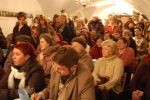The Church and Ukrainian immigrants in Poland

On 24 of February 2008 in the Greek-Catholic church of Bazylians in Warsaw, the civic initiative “Our Choice” organized a meeting for Ukrainian migrants about their rights in Poland after its accession to the Schengen zone. The speakers were representatives of the Ministry of Foreign Affairs of Poland and of the Embassy of Ukraine in Poland. Since this church in Warsaw is active in organizing various events for Ukrainian citizens, it supported this initiative and provided the place for this meeting. In that respect the activity of the Bazylians in Warsaw reflects the policy of the Greek-Catholic Church in Ukraine towards migrants.
Migration from Ukraine started soon after the collapse of the Soviet Union and went both westwards and eastwards. The Greek-Catholic Church in Ukraine was the first one to notice the migration of Ukrainian citizens abroad since the majority of the migrants (especially to the west) were Greek-Catholics and they required pastoral services. Since most of the migrants from Eastern Ukraine moving to Russia are Orthodox and the language of sermon is the same, the Orthodox Churches, especially of Moscow Patriarchate, did not see any need to develop its network and functions because of migrants.
Migrants to Central and Western Europe, regardless of their denomination, gathered at first in already existing Greek-Catholic churches. However, the number of these churches soon turned out to be insufficient for the large number of newcomers. New parishes appeared in countries where there had been little or no Greek-Catholic parishes, such as Italy, Spain or Portugal. In Poland, a network of Greek-Catholic parishes existed during the Communist times and was structurally part of the Roman-Catholic Church. The legalization of the Greek-Catholic Church in Soviet Ukraine in 1989 and the country’s gaining of independence in 1991 caused the Church in Poland to be restructured. It regained its old name and came under the authority of the Greek-Catholic Church in Ukraine. This has not significantly changed the number of parishes in Poland, but it has influenced their role.
The Greek-Catholic Church in Poland, similarly to other countries, faced new problems with the influx of the Ukrainian labor migrants in 1990s-2000s. New church-goers needed pastoral care as well as help with their personal problems. The Church, especially in large urban centers like Warsaw, became the main place of gathering for Ukrainian migrants serving even those who were not Greek-Catholics. The church of Bazylians in Warsaw is the best example of such practice. Not only that the language of the religious services is Ukrainian, but this church also provides places for socialization, such as a café where migrants can meet and talk after liturgy. There they can exchange information concerning employment, housing, possibilities to return home, documents and other matters. Job and housing announcements and advertisements are placed there.
Polish Orthodox churches in large cities are also places of gathering for migrants, especially Orthodox Eastern Ukrainians. The Orthodox Church accentuates its religious role over the social one. According to the survey carried out by the Institute of Public Affairs in 2005 in Warsaw, 74% of respondents recognized the Greek-Catholic Church as an institution interested in helping migrants in Poland; only 23% mentioned the Orthodox Church in this context.
Migration policy of the Greek-Catholic Church in Poland follows the policy of the Ukrainian Greek-Catholic Church in particular and of the Roman-Catholic Church in general. Between 2006 and 2007 the Greek-Catholic Church undertook several initiatives concerning migrants. In the decrees of Church leaders, migration appears as a problem for society whose negative consequences the Church should try to minimize. There is therefore a need for improving the pastoral care for migrants and developing a parish network abroad. A special fund was established several years ago for it and last year the Head of the Church, Lubomyr Husar, appealed to believers to make donations to this “Fund of St. Andrew” and initiated an action called “Andrew penny” (Andriyiv Grish). Further, a special manual for future priests about prevention of the human trafficking was published. In 2007 the Church collaborated with Caritas Ukraine conducting a sociological research in several European countries about the social composition and needs of migrants. The results will be used when creating the Church’s strategies for development.
In 2007 the Synod of the Greek-Catholic Church decided to establish a Day of Migrants. It was set for Fathers’ Sunday, the last Sunday before Orthodox Christmas. This date was chosen because it corresponds to the time of the Holy Family’s escape to Egypt which in effect made them migrants also. In this sense, the Head of the Church declared that Christ was a migrant like many Ukrainians.
The Church has been the main advocate of the migrants’ issues before the Ukrainian authorities since the time of president Kuchma. Despite Ukrainian politicians’ declarations of willingness to help migrants with their problems and to protect them, many Ukrainian immigrants across Europe know that real help can be found only from the Church.
Myroslava Keryk obtained her MA in history from the Ivan Franko L’viv National University and the Central European University. She is currently studying for her PhD at the Graduate School for Social Research, Polish Academy of Sciences.